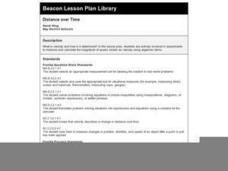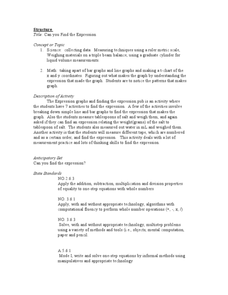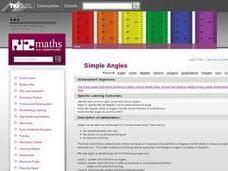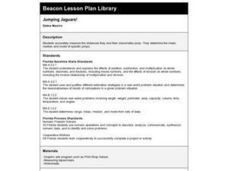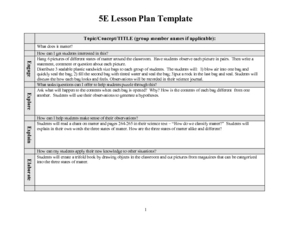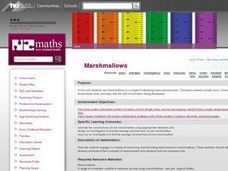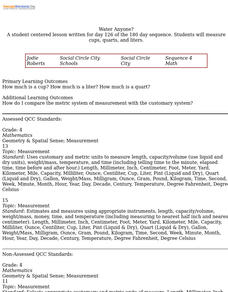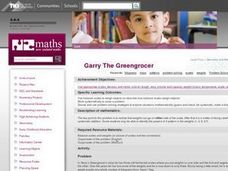Curated OER
Distance over Time
Students analyze velocity and how it is determined. They experiment with velocity in order to measure and calculate the magnitude of speed. They use examples in their novel "Skateboard Renegade" to relate velocity to real life situations.
Curated OER
Pirate Plays
Students performing a scene about pirates and spend time making a measuring meters incorporating the main character, Captain Blood to add interest. They use meter sticks measuring items from the play and record their answers in meters.
Curated OER
Puzzling Perimeters
Third graders use estimation, fractions and decimals to determine the perimeter of objects in the classroom. They are given a worksheet with a list of the items on it. The worksheet has columns beside each of the items for estimation and...
Curated OER
Exercise Those Statistics!
Students participate in various activities, measuring their pulse rates and recording the data. They analyze the statistical concepts of mean, median, mode, and histograms using the data from the cardiovascular activities.
Curated OER
Can you Find the Expression
Pupils collect data from measurements and weights for this experiment. In this algebra lesson, students analyze graphs they create form their data to find the expression representing the data. They label which graph provided the best...
Curated OER
The Metric System
Learners convert measurements within the metric system. In this measurement lesson, students explore the different units of the metric system and practice converting numbers from one unit to another.
Curated OER
Simple Angles
Third graders identify and construct right, acute and obtuse angles and begin to appreciate the degree and unit of measurement of angle. They know the degree value of angles that are simple fractions of a whole turn know that the angle...
Curated OER
Jumping Jaguars!
Second graders accurately measure the distances they and their classmates jump. They determine the mean, median and mode of specific jumps. They are required to have two measurements for each classmate, one for standing long jump and one...
Curated OER
What Does It Matter?
Students match definitions with vocabulary words and learn basic facts about matter. Then, they see how to determine the physical characteristics of matter. They determine the mass, volume, and density of objects using appropriate tools...
Curated OER
Scale Matters
Third graders study the meaning of the digits an any whole numbers with up to 3 decimal places. They order decimals with up to 3 decimal places and perform measuring tasks, using a range of units and scales.
Curated OER
What Does It Matter?
Students define matter, the chemical properties of matter, and the physical properties of matter. They name physical and chemical properties of matter (by classifying using a Tree Map). Students determine the mass, volume, and density of...
Curated OER
Cool Times with Heat
Students work with thermometers to complete problems about temperature. They investigate cooling patterns, how location affects temperature, and what happens when water having different temperature is mixed. They measure temperature in...
Curated OER
Marshmallows
Third graders estimate the volume and mass of one marshmallow using appropriate standard units. They design and carry out an investigation to find the average of volume/mass of one marshmallow.
Curated OER
Pea Brain! Explorations in Estimation
Students estimate how many peas fit in a container. In this science instructional activity, students calculate the weight of a pea and record it. They use this data to calculate how many peas fit in a human brain.
Curated OER
Efficiency Means Getting More for Less
Students measure water and make predictions about efficiency.
Curated OER
Perplexing Perimeters
In the process of constructing their own "rulers" Students develop a sense of the size of a centimeter and meter. Students select the appropriate "ruler" for the tasks. Finally, 3rd graders calculate the perimeter of objects using...
Curated OER
BY THE POUND
The student will estimate the weight and cost of produce and calculate the actual price.Discuss the difference between weight and volume. Have young scholars discuss whether it is more economical to buy produce by the pound, by the piece...
Curated OER
Triangle Explorer
Students compute the area of triangles in a computer program. In this measurement lesson plan, students complete 5 easy, 5 medium, and 5 hard problems.
Curated OER
Float or Sink?
Learners examine why some objects float while others do not. They place various objects in water to observe their floating capability. Students record the object, its weight, and if the object floated. They construct a graph plotting...
Curated OER
Average Looking
Students use measurements of their classmates to find the average (means and modes) of their facial features. They use their findings to create a three-dimensional "class head." Examples and assessment materials are included.
Curated OER
The Great Cover Up!
Students use non-standard measurement tools such as body parts, beans and counters to find the area of shapes drawn on the floor. They continue to determine the area of other objects in the classroom.
Curated OER
Garry The Greengrocer
Fourth graders are introduced to the problem by weighing objects on the balance scales. Use weights in both pans. (If you don't have access to scales use 2 containers and a child acting as the balance.) They then listen to the problem...
Curated OER
Angles: Angles, Angles, Everywhere
Students estimate and accurately measure the size of angles communicate with the appropriate geometric terms and symbols to describe and name angles, lines, line segments, rays
